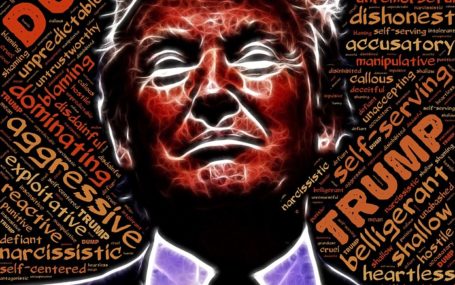HOPE not hate uses cookies to collect information and give you a more personalised experience on our site. You can find more information in our privacy policy. To agree to this, please click accept.

A GLOOMY, strange, atmosphere is coming down over both Europe and North America. It recalls some of the dark days of the interwar years.

The militia willing to kidnap Michigan’s governor Gretchen Whitmer, MilitiaWatch’s report highlighting “a serious threat to the safety and security of American voters”, and finally the trial and conviction of Greece’s extreme-right wing party Golden Dawn, should raise questions over the endurance of anti-democratic stances, authoritarian trends and violent subcultures in contemporary societies.
We are not facing a lone xenophobe. After the financial crisis, Golden Dawn became one of the largest parties in Greece. Even in opposition, it was right at the centre of the political system, neo-fascists challenging the state from within. An entire political movement, with a proper party organisation, had its leadership and tens of militants jailed because of illegal activities and violent attacks.
On the other side of the Atlantic, an armed militia group was dreaming of a sort of “civil war”, while fellow factions have openly claimed to be ready to storm state capitols and put democratically elected governors (“tyrants” in their understanding) on trial, or simply defying orders emanating from a perceived unconstitutional governmental “tyranny”.
Although there is no (immediate) threat of successful authoritarian coups, we should reflect upon the state of democracy – a system which requires freely-elected representatives and protection for human rights.
When basic rights are not respected, electoral results challenged, where voters, intellectuals, immigrants, LGBT+ people, and political opponents are targeted, and if refugees, ethnic or religious minorities are threatened or scapegoated, then democracy is under stress and may even fail.
On 31 October, I signed an open letter with a group of experts on authoritarianism, populism, fascism, and extremism, on the necessity to defend democracy – because this is clearly in a “frightening regression, irrespective of who wins the American presidency in early November.”

In particular, the story of some militia groups active today in the US, or the trial in Greece, show how much of the far right is not “democratic.”
Calling for civil wars, creating paramilitary units, supporting the superiority of a “pure” ethnic group over the others, threatening public officers, or hoping to overthrow governing institutions, is far from any liberal idea or political practice characterising post-1945 western democracies.
When that happens, we usually face terrorist factions, apartheid or authoritarian states: such as right-wing terrorism beginning in the late 1960s Italy, in South Africa’s racist regime, or the Greek regime of the “colonels” in of the late-1960s – mid-1970s.
If Golden Dawn is an openly violent neo-fascist organisation, the U.S. militia movements are a more complex phenomenon with roots in some North American inner cultures. However, they are part of the global history of ultra-nationalist and right-wing extremist groups.
Given the current twisted perceptions of a coming ‘leftist coup’ and the benevolence from political figures and select local law enforcement, they might really jeopardise the political system.
As with the Europe’s post-WWI counter-revolutionary movements, some contemporary paramilitary militia are similarly countering left-wing groups, social change, and an apparent national decline, while appearing to be legitimate defenders of traditional values or rural communities.
They are not all necessarily “fascist”, but we may observe a process of radicalisation.
In the interwar United States, the American Legion, the Silver Shirts, the Black Legion or radio stars such as Father Coughlin turned to fascism, embracing, in various ways, hatred towards Jews and socialism, and endorsed violence.
The problem is when to “regenerate” and “defend” nations, and when elites join forces with fascist units around policies promoting patriotism and social order. In Italy, the birthplace of fascism, business and landowners used Mussolini’s squads to counter labor unions and socialists, while the ruling political class thought they could easily integrate in the political system and control fascists.
The result was the establishment of a dictatorship. Is this sounding familiar?
Today nationalist propaganda and extreme-right parties are constant realities across the globe. Almost no countries are “immune” to right-wing extremism and the anglosphere is among the clearest symbol of this phenomenon.
Violence, the suppression of opponents, and a disdain for the democratic rule are, again, part of an extremist agenda which, like in the interwar years, is empowered by some ruling elites. The only difference is that they are now masked with populist camouflage, pro-Christianity or anti-Islam slogans, anti-lockdown protests, and anti-immigrant propaganda.
Yet, there are some troubling days ahead. Although Golden Dawn was left unchallenged for years, the recent legal verdict in Athens was celebrated by tens of thousands of people, including a former prime minister and Greece’s current president.
In Michigan, rather than condemning subversive action planned against Governor Whitmer, President Trumps’ supporters were instead chanting, “lock her up!”.
As groups could be mobilising under the guise of poll watchers or defenders of “fair” elections, the coming weeks may be fundamental for the future of democracy not just in America but globally.

Andrea Mammone (@Andrea_Mammone) is a historian of modern and contemporary Europe.


A Reform Party candidate fantasised about deporting “millions” of British citizens to “rid itself of the foreign plague we have been diseased with”. UPDATE: Reform…